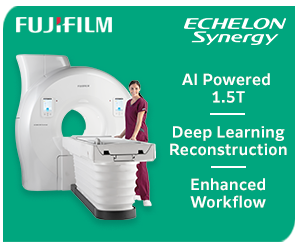AI Tool Accurately Detects Six Different Cancer Types
A novel AI approach can accurately detect six different types of cancer on whole-body PET/CT scans, according to research presented at the 2024 SNMMI Annual Meeting. By automatically quantifying tumor burden, the new tool can be useful for assessing patient risk, predicting treatment response, and estimating survival.
“Automatic detection and characterization of cancer are important clinical needs to enable early treatment,” says Kevin H. Leung, PhD, a research associate at Johns Hopkins University School of Medicine in Baltimore. “Most AI models that aim to detect cancer are built on small to moderately sized datasets that usually encompass a single malignancy and/or radiotracer. This represents a critical bottleneck in the current training and evaluation paradigm for AI applications in medical imaging and radiology.”
▼ ADVERTISEMENT

To address this issue, researchers developed a deep transfer learning approach (a type of AI) for fully automated, whole-body tumor segmentation and prognosis on PET/CT scans. Data from 611 FDG PET/CT scans of patients with lung cancer, melanoma, lymphoma, head and neck cancer, and breast cancer, as well as 408 PSMA PET/CT scans of prostate cancer patients were analyzed in the study.
The AI approach automatically extracted radiomic features and whole-body imaging measures from the predicted tumor segmentations to quantify molecular tumor burden and uptake across all cancer types. Quantitative features and imaging measures were used to build predictive models to demonstrate prognostic value for risk stratification, survival estimation, and prediction of treatment response in patients with cancer.
▼ ADVERTISEMENT
 |
Light Therapy Could Aid in Brain Recovery
According to a study published in Radiology, low-level light therapy apparently elicits healing effects in the brains of patients with brain injuries.
AI Aids in Detecting Tumor DNA in Blood
By combining AI and liquid biopsy, researchers at Weill Cornell Medicine, New York-Presbyterian, were able to determine that their trained algorithm could detect circulating tumor DNA with efficiency and accuracy. Their study is published in Nature Medicine.
AI Accurately Identifies Common Lung Cancer
A “self-taught” AI model can accurately diagnose adenocarcinoma, according to a study conducted by researchers from NYU Langone Health and the University of Glasgow in Scotland. |
“While 18F-FDG PET/CT can offer some information about ILDs, FAPI PET/CT could provide even more information to physicians, especially regarding progressive pulmonary fibrosis. ... In particular, our research shows that patients with high whole-lung SUVmean on FAPI scans tend to manifest progressive pulmonary fibrosis one year later. ... This could make it a promising diagnostic tool.”
— Qi Fang, a student in resident training in the department of nuclear medicine at Guangzhou Medical University in Guangzhou, China, and coauthor of a study on the accuracy with which fibroblast activation protein inhibitor (FAPI) PET/CT predicts pulmonary fibrosis in patients with interstitial lung disease (ILD) |
|
|
COVER STORY
An Interesting Case
Forensic radiology can forgo the need for traditional autopsy, reducing the burden on forensic pathologists during ongoing worker shortages.
FEATURE
Standing By
The presence of parents during pediatric MRI procedures can have both positive and negative effects.
|
|
|
| Advertising Opportunities |
Have a product or service you want to market to radiology professionals? Utilize the reach of Radiology Today Magazine to accomplish your marketing goals. Email our experienced account executives today at sales@gvpub.com or call 800-278-4400 for more information.
|
| © 2024 Radiology Today Magazine |
|
|